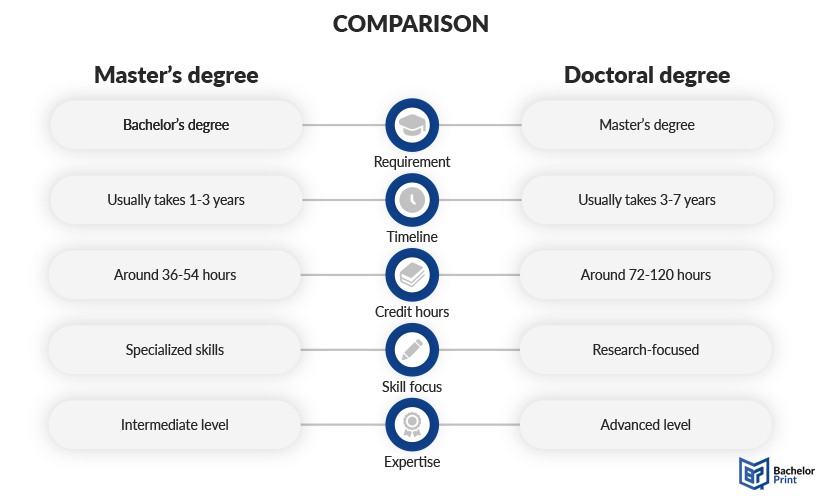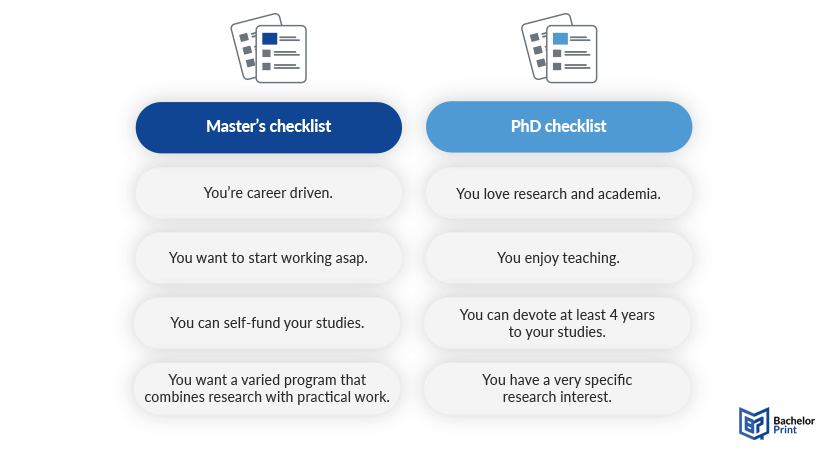
Deciding between pursuing a master’s degree or a PhD is a crucial step in one’s academic journey within graduate school. While both options offer advanced education and research opportunities, they differ in terms of scope, duration, and career outcomes. Deciding between a master’s and a PhD in graduate school? In this guide, we will explore the distinctions between master’s and PhD programs, helping you make an informed decision about your academic path.
Definition: Master’s vs. PhD
A master’s degree combines taught elements with research. The coursework for a master’s degree includes assignments, exams, and a research project or dissertation.
A PhD, also referred to as a doctoral degree, is research-based and focuses on a single topic. PhDs are awarded after submitting a written thesis and passing an oral test (viva).
On average, a person with a doctoral degree can make about $430 more on a weekly basis than a person with a master’s degree.
- ✓ 3D live preview of your individual configuration
- ✓ Free express delivery for every single purchase
- ✓ Top-notch bindings with customised embossing

Comparison
In this section, we’ll compare master’s and doctoral degree.
Time requirements
A master’s degree generally takes 1-3 years to complete, depending on whether studies are part-time or full-time. This applies to most countries worldwide.
A PhD usually requires 3-7 years, with time spent on coursework, research, and dissertation writing. Compared to the U.S., European PhD programmes are shorter.
Research
A master’s degree focuses on building specialized knowledge or practical things, typically involving taught courses and a final project/thesis. Basically, you’re trained to know things.
A PhD emphasizes independent researching by training students to become creators of new knowledge through original research resulting in a dissertation. So, you’re trained to teach yourself things.
Career possibilities
This degree opens doors to advanced professional roles, promotions, and higher salary potential in a wide range of industries but is less commonly required for university-level research or teaching positions.
A master’s can prepare you for a specific job, e.g., a master’s in counselling or for a generalist path, e.g., a master’s in English literature.
Note: Salaries may vary depending on location.
A doctorate degree prepares graduates for careers in academia, research, higher education, and specialized roles requiring subject-matter expertise. As such, PhD graduates can work in academia, where they can teach at universities.
They can move up the academic ladder and become professors, which requires extensive teaching experience, having a large body of published research, participating in conferences, and being active in faculties.
Note: Salaries may vary depending on location and industry.
Tuition fees
Master’s tuition fees are typically higher due to limited financial aid, resulting in students having to self-fund their degree.
- For a master’s in management for instance, tuition fees for public universities go from $30,000 to $120,000 and starting at £8,000 for British students.
- Typical tuition fees for private universities in the US are similar to fees in public institutions, whereas in the UK, they start at £22,000.
Some universities offer scholarship opportunities that cover tuition fees. The most well-known scholarships are:
- DAAD (Germany)
- Fullbright (USA)
- Mext (Japan)
- Gates Cambridge (UK)
To complete a doctorate degree, you first need a completed master’s degree. For PhDs, tuition fees are typically waived as students receive a small stipend that covers living expenses in exchange for working as instructors or research assistants.
Some universities also offer full or partial PhD scholarships. Sometimes, financial aid is also offered by government institutions, which award scholarships to outstanding students.

Applications
Although the application procedure for master’s vs. PhD degrees is different, in most cases you’ll need to submit the following documents:
- Undergraduate diploma and transcript
- Motivation or presentation letter
- CV
- Letter of recommendation
Since each university has different requirements for master’s and PhD applications, it’s important to check with the department in question.
Master’s degree applications require evidence of previous undergraduate studies.
- In the US, it’s also common to require a minimum GPA score of 3.0, plus additional tests like GMAT (for business and management Master’s) or LSAT (for law degrees).
- In the UK, applications must include proof of an undergraduate degree with at least a 2:1 score, full academic transcripts, and proof of English language proficiency. GMAT and LSAT aren’t always required. You need to check with each university to see what applies.
Since PhDs are research-oriented, the application must reflect your research interests and background. The application must also include:
- A proposal where you describe your goals
- Framework
- Relevance of your research topic
In the UK, PhD applications don’t usually have a cost. Before applying, you should contact potential supervisors to ensure your research interests are a good fit. Deadlines usually close 1-3 months before the start date.
In the US, the research proposal doesn’t carry as much weight as it does in the UK. US universities consider other factors, such as personal and academic achievements and extracurricular interests. There’s usually a cost associated with US applications, and they can be filed between August and December.
Checklists
The image below provides checklists for future PhD and master’s students.

FAQs
Yes. A PhD is generally considered a higher academic qualification than a master’s degree since a PhD represents the highest level of academic study and includes original research that contributes new knowledge.
Not necessarily. The duration of a doctoral degree after a master’s varies by country, field, and programme. Oftentimes, a PhD takes at least three years.
No. A master’s degree does not confer the title of Doctor. The Dr. title is earned by completing a doctoral degree.
In some countries and programs, yes. However, many PhD programmes prefer or require a master’s degree as a prerequisite of they expect substantial relevant research experience.